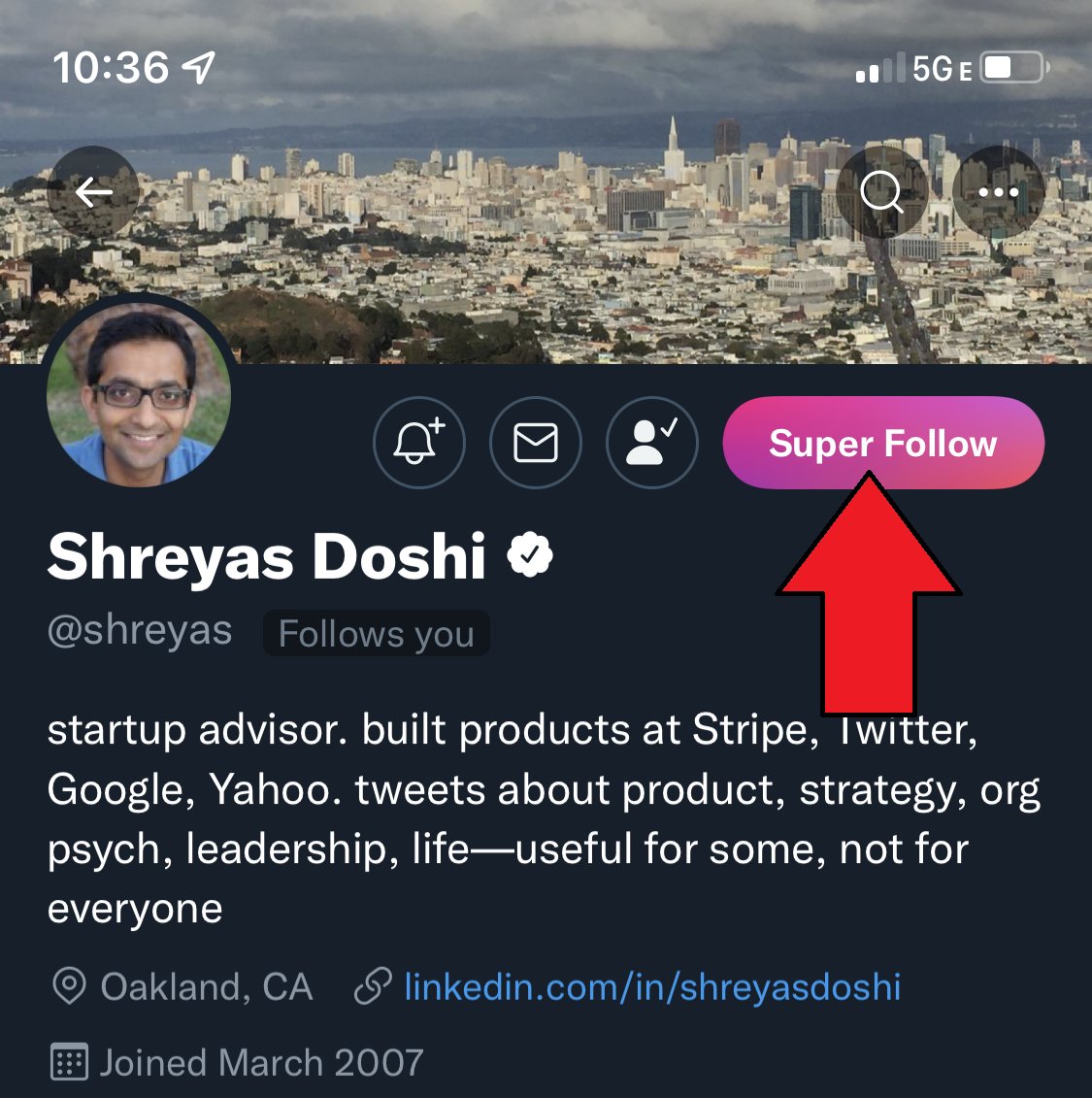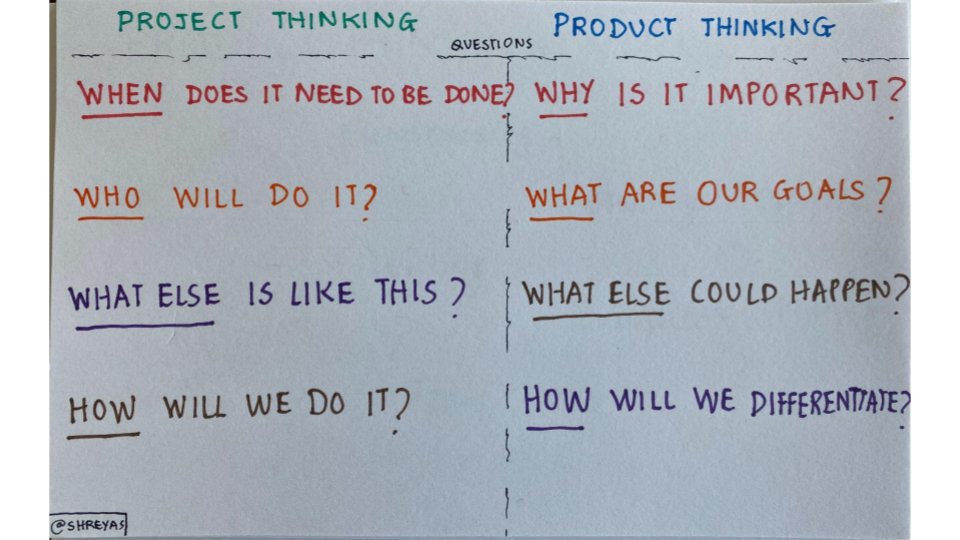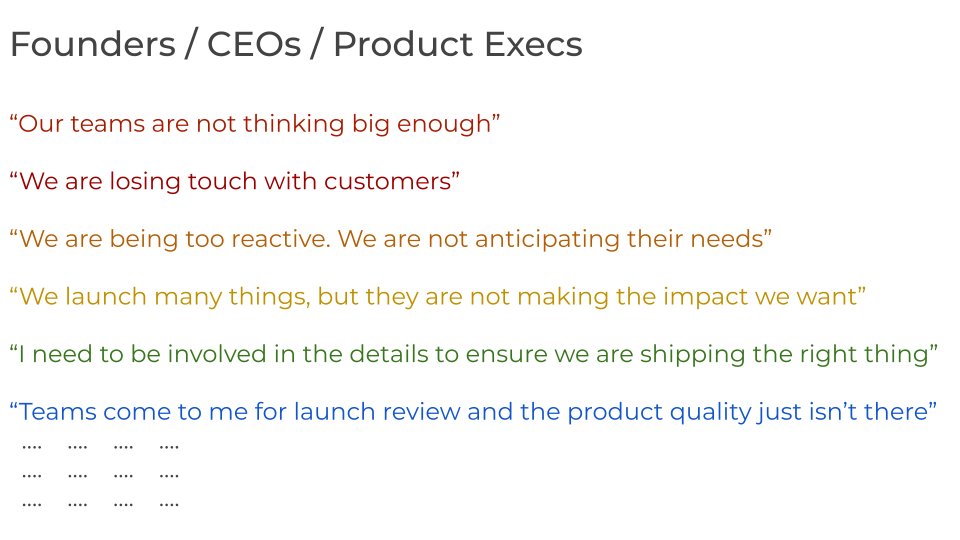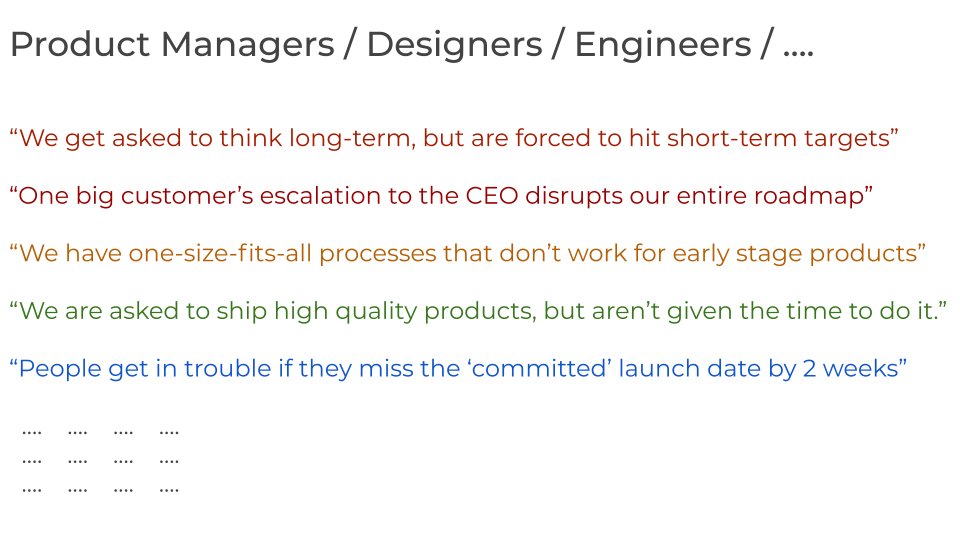
There are 3 types of work that people have to do within their organization:
• Produce
• Arrange
• Impress
Suboptimal allocation of the individual’s & the group’s time across these 3 types of work begets Frustration, Politics, Dysfunctional Organizations.
An offbeat thread:
• Produce
• Arrange
• Impress
Suboptimal allocation of the individual’s & the group’s time across these 3 types of work begets Frustration, Politics, Dysfunctional Organizations.
An offbeat thread:
Frustration:
Managers should create clarity for each employee on the optimal allocation of their time across these 3 types of work, for their specific role within the org.
But sadly very few managers do.
∴ subjective defaults are chosen by each party.
∴ mutual Frustration.
Managers should create clarity for each employee on the optimal allocation of their time across these 3 types of work, for their specific role within the org.
But sadly very few managers do.
∴ subjective defaults are chosen by each party.
∴ mutual Frustration.
Politics:
Politics can be defined as a latent bias towards Impress-work at the expense of the Produce- & Arrange-work needed for an optimal outcome for the organization.
This bias is rooted in an individual, but with sufficient individual influence, can spread across teams.
Politics can be defined as a latent bias towards Impress-work at the expense of the Produce- & Arrange-work needed for an optimal outcome for the organization.
This bias is rooted in an individual, but with sufficient individual influence, can spread across teams.
Dysfunctional Organizations:
In a Dysfunctional Organization, senior leaders encourage suboptimal allocation of individuals’ & teams’ time across these 3 types.
This tendency could be willful (Intentionally Dysfunctional) or a blindspot (Accidentally Dysfunctional).
In a Dysfunctional Organization, senior leaders encourage suboptimal allocation of individuals’ & teams’ time across these 3 types.
This tendency could be willful (Intentionally Dysfunctional) or a blindspot (Accidentally Dysfunctional).
Undetected and unchecked, this tendency can rapidly become a part of the “culture” of the organization.
Accidentally Dysfunctional organizations can be turned around with candor, humility, and hard work.
Intentionally Dysfunctional organizations are probably irreparable.
Accidentally Dysfunctional organizations can be turned around with candor, humility, and hard work.
Intentionally Dysfunctional organizations are probably irreparable.
I’ve encountered more Accidentally Dysfunctional orgs than Intentionally Dysfunctional ones over my career & mentorship conversations.
Some ostensibly Well-Functioning orgs might be very mildly Accidentally Dysfunctional, with their leaders working very hard to fix the issues.
Some ostensibly Well-Functioning orgs might be very mildly Accidentally Dysfunctional, with their leaders working very hard to fix the issues.
Now, Dear Intrepid Reader,
I hear you as you say that some definitions of the 3 types of work—Produce, Arrange, Impress—would be helpful.
Or more likely, would have been helpful 5 tweets ago. 🙃
Remember, offbeat thread.
Without further ado, let’s try to define the 3.
I hear you as you say that some definitions of the 3 types of work—Produce, Arrange, Impress—would be helpful.
Or more likely, would have been helpful 5 tweets ago. 🙃
Remember, offbeat thread.
Without further ado, let’s try to define the 3.
Produce:
Produce-work is about creating or maintaining artifacts to optimally serve the org’s stated purpose for its external stakeholders. The stakeholders are mainly customers, but they can also be partners, regulators, press, shareholders, etc.
Produce-work is about creating or maintaining artifacts to optimally serve the org’s stated purpose for its external stakeholders. The stakeholders are mainly customers, but they can also be partners, regulators, press, shareholders, etc.
Arrange:
Arrange-work is about creating structures & processes that enable the org to do its Produce-work more efficiently or effectively. Arrange-work does not directly manipulate the artifacts that the org produces for its external stakeholders but indirectly affects them.
Arrange-work is about creating structures & processes that enable the org to do its Produce-work more efficiently or effectively. Arrange-work does not directly manipulate the artifacts that the org produces for its external stakeholders but indirectly affects them.
Impress:
Impress-work is about creating a proxy for the worker’s impact & competence. It’s usually done by the worker, for the consumption of internal stakeholders who'll accordingly make decisions about (a) the rewards for the worker, and (b) the worker's future within the org.
Impress-work is about creating a proxy for the worker’s impact & competence. It’s usually done by the worker, for the consumption of internal stakeholders who'll accordingly make decisions about (a) the rewards for the worker, and (b) the worker's future within the org.
Let's see examples.
Produce-work: products, eng infra, sales deals, professional services, support, project updates,...
Arrange-work: internal processes, org design, re-orgs, hiring, talent reviews, internal events,...
Impress-work: self-reviews, 1:1s with manager (partly)
Produce-work: products, eng infra, sales deals, professional services, support, project updates,...
Arrange-work: internal processes, org design, re-orgs, hiring, talent reviews, internal events,...
Impress-work: self-reviews, 1:1s with manager (partly)
Note that each of these 3 types is essential in a Well-Functioning org i.e. there’s nothing *inherently wrong* with Impress-work as a type of work to be done.
At times, some employees (especially highly productive ones) might pooh-pooh Impress-work and view it with disdain.
At times, some employees (especially highly productive ones) might pooh-pooh Impress-work and view it with disdain.
But a small amount of Impress-work, done right & with the right intentions, is actually globally-optimal for the org. Orgs are complex beings, and it is therefore essential for its well-being that your impact on the org is well-understood, positioning you for even greater impact.
There are 2 sub-types of Impress-work:
• Jekyll-Impress
• Hyde-Impress
Benevolent leaders’ inability to precisely & consistently differentiate between them in the throes of complex ongoing org action is the primary weakness leading to Frustration, Politics, & Org Dysfunction.
• Jekyll-Impress
• Hyde-Impress
Benevolent leaders’ inability to precisely & consistently differentiate between them in the throes of complex ongoing org action is the primary weakness leading to Frustration, Politics, & Org Dysfunction.
Jekyll-Impress: This is the good kind of Impress-work that, when performed at the right frequency & duration, creates optimal org outcomes.
Hyde-Impress: This is Impress-work that’s usually disguised as Produce- or Arrange-work but is impure because it carries a hidden agenda.
Hyde-Impress: This is Impress-work that’s usually disguised as Produce- or Arrange-work but is impure because it carries a hidden agenda.
Examples of Hyde-Impress:
• Status updates that depict greater progress than the reality
• Pushing for high-stakes meeting attendance at high-stakes meetings to “get visibility”
• Turf wars during re-orgs
• Taking on high visibility projects when others could do a better job
• Status updates that depict greater progress than the reality
• Pushing for high-stakes meeting attendance at high-stakes meetings to “get visibility”
• Turf wars during re-orgs
• Taking on high visibility projects when others could do a better job
(additional examples left as an exercise for the reader, you KNOW you’ve seen plenty)
Alright, time to wrap up
My goal here was to create awareness of the 3 types of work, the sub-types of Impress-work, their contribution to the formation of Well-Functioning & Dysfunctional orgs, & the role that leaders implicitly or explicitly play in creating Dysfunctional orgs
My goal here was to create awareness of the 3 types of work, the sub-types of Impress-work, their contribution to the formation of Well-Functioning & Dysfunctional orgs, & the role that leaders implicitly or explicitly play in creating Dysfunctional orgs
I don’t yet have all the answers on this topic, but I hope you’ll consider these concepts & this lexicon in the context of your own organization. If you choose to do so, you can start with this foundation, but don’t be afraid to refine & adapt these ideas to your specific context
And if by doing so you make a breakthrough, however major or minor, please do share your approach with me and other folks around you.
There’s a lot more to learn here.
❤️
There’s a lot more to learn here.
❤️
Footnote:
The original idea here of the types of work was inspired by this line in the book Principles by @raydalio.
“in most companies people are doing two jobs: their actual job and the job of managing others’ impressions of how they’re doing their job.”
Was a💡moment for me
The original idea here of the types of work was inspired by this line in the book Principles by @raydalio.
“in most companies people are doing two jobs: their actual job and the job of managing others’ impressions of how they’re doing their job.”
Was a💡moment for me
• • •
Missing some Tweet in this thread? You can try to
force a refresh










